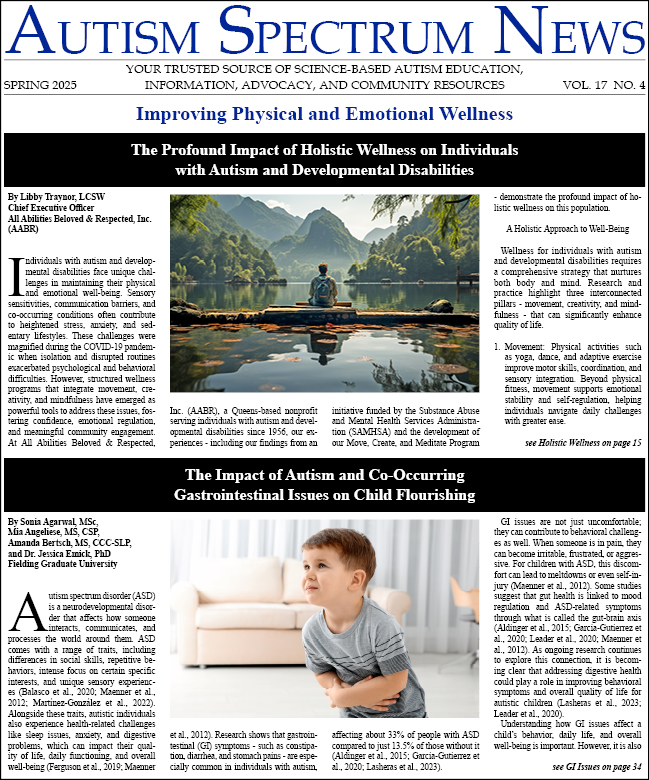-
The Impact of Autism and Co-Occurring Gastrointestinal Issues on Child Flourishing
Author’s note: Recent trends in language use within the autism community show a divide between professionals who often prefer person-first language (e.g., “person with autism”) and autistic advocates who often favor identity-first language (e.g., “autistic person”), for reasons of...
-
Pulling It All Together: How to Create a Multidisciplinary Team for Your Child With Autism
When families receive an autism diagnosis for their child, they may not realize they are also likely receiving a diagnosis for other medical and behavioral health conditions that have not yet been identified. Autism is a chronic condition that requires ongoing treatment and support. Certain...
-
ECHO Autism for Mental Health Clinicians: Creating Access to Specialized Care in Local Communities
The growing population of individuals on the autism spectrum who have co-occurring mental health conditions necessitates a workforce of mental health professionals who are competent and confident in working with these individuals. Unfortunately, the current research depicts a large gap between that...
-
Helping Youth with Autism and Co-Occurring Low Vision and Blindness
The prevalence of autism has been increasing over the years. The CDC estimates that 1 out of every 44 children has an autism spectrum condition (CDC, 2021). It has changed from a low-incidence disability (i.e., 1 in 10,000) to a more common one. Blindness, on the other hand, is currently considered...
-
Managing Feeding and Toileting Challenges in Children with Autism
Challenges with toilet training (e.g., frequent accidents, withholding urine or feces) and eating (e.g., food selectivity, getting sufficient nutritional intake) may have a significant impact on the child’s functioning in the home, school, community, and social events. These issues often impact...
-
Is It Genetic? My 40-Year Journey of Misdiagnoses for My Son
Forty years ago, my son Matthew was born. At the time of his birth, he had no apparent health issues. We began noticing that he wasn’t developing like a neuro-typical child when he wasn’t hitting milestones like rolling over. Since then, we have gone through countless tests and been given...
-
A Call to Action: The Need for Advocacy in Healthcare Access in Autism
Although specific estimates vary substantially, autistic children and adults have a higher prevalence of comorbid medical conditions than those reported in non-autistic individuals. Among the most commonly reported comorbid medical conditions are neurological disorders, including epilepsy,...
-
Autism, Epilepsy, and Seizures: How to Recognize the Signs and Administer Basic First Aid
The purpose of this information is to offer general information on Autism and Epilepsy and the co-condition as well as the types of seizures and basic first aid recommended by the Epilepsy Foundation. This information is taken from Seizure Recognition and First Aid, a publication of the Epilepsy...
-
A Person-Centered Collaborative Approach to Achieving Best Outcomes for Autistic Individuals with Co-Occurring Conditions
Autism Spectrum Disorder (ASD) is characterized by the presence of persistent deficits in social communication and social interaction across multiple contexts as well as restrictive, repetitive behavior, interests, or activities (American Psychiatric Association, 2013). Many individuals with ASD...
-
Ehlers-Danlos Syndrome and Its Comorbidities as a Co-Occurring Health Issue in Autistic People
Ehlers-Danlos Syndrome (EDS) occurs in as many as 8% of autistic individuals with even a higher percentage that may have hypermobility spectrum disorders (HSD) (Cederlof et al., 2016, Kindgren et al., 2021). This estimate is low since EDS is more commonly diagnosed in females (Castori, 2012), who...




